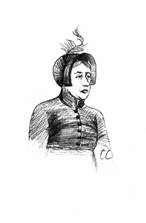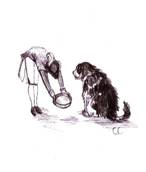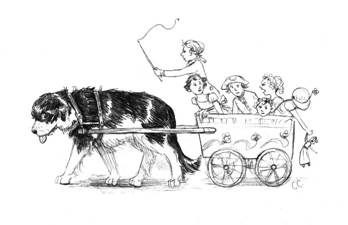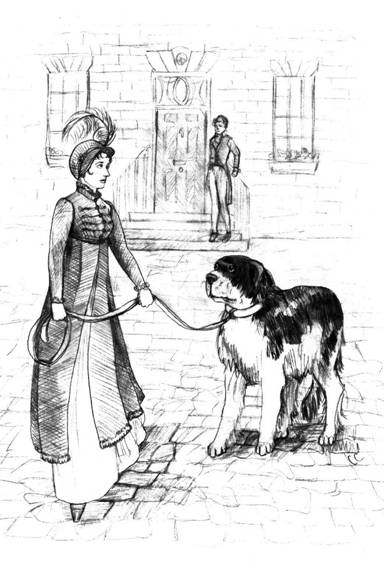There Must Be Murder (6 page)
Read There Must Be Murder Online
Authors: Margaret C. Sullivan
Tags: #jane austen, #northanger abbey, #austen sequel, #girlebooks

“Until tonight, then.” He bobbed a sort of bow
at Catherine and hurried back towards the shop.
As they walked back to Laura-place, Miss
Beauclerk seemed inclined to be quiet, and Catherine allowed her to
be so. Finally she said, “Mrs. Tilney, I must ask you a favor; on
such a short acquaintance as ours, I have no right; but I pray you
will not mention this to my mother.”
“Yes, I suppose she might worry if she knew
about your tonic.”
Miss Beauclerk looked her surprise. “She knows
about my tonic, and what it contains. She uses something similar
herself. It was due to her influence that I asked Mr. Shaw to
provide it. Mother has her own supplier. But I meant meeting Mr.
Shaw. She does not quite approve of my seeing him. I did not intend
to—but it is too late for that. I pray you will not mention
it.”
Catherine promised that she would not as they
entered Laura-place.
“Will you come in for a moment?” asked Miss
Beauclerk. “You may take leave of Mamma, and let her know that I
have not been wandering the streets of Bath alone, and getting into
mischief.”
Catherine thought her request rather
extraordinary, but did not know how to refuse it.
They arrived at the door of Lady Beauclerk’s
house at the same time that a dowdy chaise, drawn by a pair of
shaggy horses, drew up. An elderly servant in well-worn livery
climbed down heavily from his perch and, seeing Miss Beauclerk
staring at him, waved and grinned toothlessly.
“Oh, Lord,” said Miss Beauclerk under her
breath.
Catherine looked at the servant curiously. “Who
is that?”
“He is my aunt Findlay’s man. Well, Mrs. Tilney,
it seems that you will have the opportunity to meet one of the more
eccentric members of my family, arrived with her usual fortunate
timing just as we thought to pass ourselves off creditably in
Bath.”
Catherine, unsure how to respond, said, “I have
a great-aunt who likes to read me lectures.”
“Then you understand what it means to have a
relative whose main purpose in life is to mortify one.”
The servant opened the chaise door and let down
the steps, and his mistress emerged: a woman tall and solidly
built, with a great beak of a nose and a long chin to match. She
looked up at the house and said, “Of course she took one of the
grandest houses in Bath. Such unwonted extravagance! But that is
your mother all over, Judith. What my poor brother would have
thought of it, I am sure I do not know.”

“Good day, aunt,” said Miss Beauclerk.
“Good day, indeed! Do not think I have not heard
what you all have been up to, aye, and that ne’er-do-well nephew of
mine, too. I have my informants, miss.”
“I am sure you do, aunt.” Seeing how Mrs.
Findlay stared at Catherine, she added, “May I present Mrs. Tilney
to your notice?”
“Tilney, eh? I have heard that name, oh yes
indeed. I know what your set is up to.” Mrs. Findlay swept past
both ladies and the footman who held the door. “I trust I need not
send up my card; I trust the dowager will see her poor widowed
sister.”
“Oh, dear,” whispered Miss Beauclerk. “Mamma
will not like it if my aunt insists on calling her ‘the
dowager.’”
“Perhaps I should just go back to our lodgings,”
said Catherine.
“No, no; Mamma will take it amiss if you do not
come up, just for a moment. Pray do, ma’am.”
Catherine could not resist a supplication made
with such softly pleading eyes; and she was herself interested in
seeing her ladyship’s reaction to being called “the dowager.”

The footman said to her, “Begging your pardon,
ma’am, but your dog looks like he could use a drink of water. I can
take him to the kitchen if you like.”
Catherine looked at MacGuffin’s hanging tongue
and agreed, and the Newfoundland padded down the hall behind the
footman as the ladies climbed the stairs to her ladyship’s
sitting-room.
Sir Philip was there, paying his daily duty call
upon his aunt; he acknowledged Catherine with a nod and a smile,
which she returned, still grateful for his kindness of the previous
evening.
Mrs. Findlay was berating her sister-in-law. “It
had to be Laura-place, did it not, Agatha? No Queen-squares for
you, ma’am! And my poor brother not cold in his grave. ’Tis not
enough that one of you disposed with him, but you must revel in it
by making merry with his fortune!”
“I am sure that I do not know what you are
talking about, Fanny,” said her ladyship; though her blush did not
escape Catherine’s sharp eye.
“I believe you do, Agatha; I know one of you
does. You,” she said, looking at Sir Philip, “or you,” turning a
glare upon her niece.
“What are you suggesting, madam?” asked Sir
Philip, his voice low and dangerous.
“I suggest nothing, sir; I state it for all to
hear. I am come to Bath to determine which of you murdered my
brother.”
Murder and Everything of the Kind
Mrs. Findlay’s words shocked all present into
silence.
“Really, Fanny,” said Lady Beauclerk in a faint
tone of voice. “You must be reading horrid novels to imagine such a
thing. Poor Sir Arthur, murdered! After he suffered so! I am sure
that no man could have been more tenderly nursed by his wife and
daughter.”
“Giving you the perfect opportunity to assist
his exit from this world. And you,” said Mrs. Findlay, rounding on
Sir Philip, “always hanging around and ingratiating yourself with
the old man. You did not think he would hear about your unsavory
adventures, did you? You are fortunate he did not cut you out of
the will!”
“Beaumont is entailed,” said Sir Philip.
“Whatever my uncle thought of me—and I think, and hope, he thought
well—he did not have the power to disinherit me.”
“From the title and the estate, perhaps not; but
what of the funded monies? I know of a few provisions in the
entailment that would have put you in a very uncomfortable
situation indeed: master of a great estate, and unable to afford to
run it!”
“There was no reason for my uncle to change the
provisions of his will,” said Sir Philip with a touch of
impatience.
“No reason? After the way you carried on in
Brighton last summer? To think I would live to see a Beauclerk
involved in a criminal conversation!”
Catherine was paying little attention to the
argument between Sir Philip and his aunt. She was thinking over
everything she had learned that afternoon: that Sir Arthur’s sister
thought his death had not been natural; that both Lady Beauclerk
and her daughter had private, secret access to strong poison; and
that the apothecary who provided Miss Beauclerk with that poisonous
potion had tended Sir Arthur in his last days. A younger Catherine
might have reached a most alarming conclusion indeed; but as Henry
had once bid her, she now consulted her own sense of the probable.
It did not seem possible that a man such as Sir Arthur Beauclerk,
tended by a retinue of servants and physicians, could be the victim
of a murderous plot; but the Beauclerks were an unhappy family, and
who could tell to what measures the desperate might resort?
Sir Philip, mistaking Catherine’s thoughtfulness
for distress, or perhaps just embarrassed that an outsider was
witnessing the incident, said, “Mrs. Tilney should not have to
listen to this.”
Mrs. Findlay whirled about. “Tilney! I have
heard that name. You may tell General Tilney, madam, that he is in
my sights as well. Sniffing round the widow before my poor brother
had been dead half a year! I dare say that fancy Abbey of his costs
a pretty penny to run. He’ll have a mind to your jointure, Agatha,
you may depend upon it.”
“That is enough, aunt,” said Sir Philip. He
crossed the room to where Catherine stood and took her elbow. “Let
me procure a chair to take you home, ma’am.”
“Yes, let Philip help you,” said Miss Beauclerk.
“Thank you for coming out with me this morning, Mrs. Tilney, and I
hope to see you tonight at the theatre.”
Catherine hastily took her leave; Sir Philip
escorted her down the stairs and waited with her while the footman
went off to fetch MacGuffin.
“May I get you a chair?”
“Oh, no; my lodgings are just a few steps away,
and I have my dog.”
“One of the footmen could bring your dog to your
lodgings, and you are distressed by my aunt Findlay’s nonsense.
Pray let me procure you a chair.”
“Oh, I am not distressed,” said Catherine.
He looked at her closely. “Are you not?”
“No, sir; I am perfectly able to walk; but is
very kind of you to think of it.”
“Most women would have a fit of the vapors at
overhearing such an extraordinary declaration as my aunt’s. I
salute you, Mrs. Tilney.”
Catherine smiled and blushed as the footman
returned, leading MacGuffin.
Sir Philip looked at the Newfoundland and said,
“Good Lord. No, you need no chair, Mrs. Tilney; you could ride this
fellow home.”
Catherine considered this. “Henry talks of
training him to pull a little cart to give rides to the children of
our parish. But that would not do for me.”

Sir Philip smiled. “Indeed not, madam; though he
is a handsome lad.” He bent to pet MacGuffin, but the dog pressed
against Catherine and made a sound somewhere between a snort and a
growl.
“For shame, Mac!” cried Catherine. “Sir Philip
means me no harm.” MacGuffin looked up at her with sorrowful eyes.
To Sir Philip she said, “He really is a very good-natured creature
in general.”
“He probably caught a scent of Lady Josephine
upon me. That deuced creature will get my coat all over hair when I
call upon my aunt.”
“Yes, that must be the case. Good day, Sir
Philip, and thank you again for your kindness.”
“It was my pleasure, ma’am. Did I hear my cousin
say that you would be at the theatre tonight?”
“Yes, Lord Whiting procured a box and invited us
to join him.”
“May I look forward to the pleasure of visiting
your box between acts?”
Catherine was unsure of the proper response to
such a proposal. “Why—yes, I dare say his lordship will not
mind.”
“That is very good of you to say.” He raised her
gloved hand to his lips. “Until tonight.”
Catherine, blushing at such attention, hastily
said good-bye and left the house. As she reached Pulteney-street,
she could not help looking back; Sir Philip still stood in the
doorway of his aunt’s house, watching after her with a little
smile.

